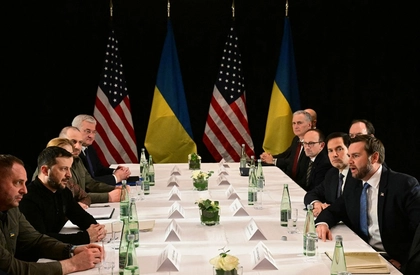Yet another massive Russian missile attack hit cities across Ukraine overnight, killing at least six people and prompting massive power outages including at Europe's largest nuclear power plant.
JOIN US ON TELEGRAM
Follow our coverage of the war on the @Kyivpost_official.
Ukraine's commander in chief Valery Zaluzhny said in a statement that 81 missiles had been fired by Russia, 34 of which were shot down.
President Zelensky on Thursday morning lashed out at Russia's "miserable tactics" used to "intimidate Ukrainians again", adding: "The occupiers can only terrorize civilians."
Lviv
Five people were killed in Zolochiv in the western Lviv region after a Russian missile struck a residential building, the city’s governor said on Thursday morning.
Kyiv
The attack sparked one of the longest air raid alerts of the war in the capital, with sirens sounded a few minutes before 1am and the-all clear not being given until nearly seven hours later at 7:49am.
Kyiv mayor Vitali Klitschko reported explosions in a southern part of the capital shortly after 6am and further explosions in the western Svyatoshynsky district an hour later, in which two people were reported injured.
Ukrainian energy operator DTEK's Kyiv division said that "due to an enemy attack, emergency power outages are in force" and 15 percent of households in the capital were without power in the morning and 40 percent without heating.
By 5pm, power had been restored throughout the city.

Munich and After: An Unprincipled Mess
Smoke rising from Kyiv thermo-electric power station this morning after Russian missiles struck at cities across Ukraine, from Dnipro to Lviv. pic.twitter.com/zAjNDVqOme
— Maxim Tucker (@MaxRTucker) March 9, 2023
Zaporizhzhia
Ukraine's Zaporizhzhia nuclear power plant was left without electricity supply following a Russian strike and is currently running on diesel generators, the country's nuclear energy operator said on Thursday morning.
"The last line of communication between the occupied Zaporizhzhia NPP and the Ukrainian power system was cut off as a result of rocket attacks," Energoatom said in a statement.
"This is a serious breach to the nuclear safety, caused by Russia," EU foreign policy chief Josep Borrell told reporters during a meeting the EU's development ministers in Stockholm, adding that the plant's temporary need to use diesel generators to cool the plant for several hours before power was restored had "significantly" increased the risk of a nuclear accident.
Dnipropetrovsk
In the Dnipropetrovsk region, a "34-year-old man died as a result of the shelling. A 28-year-old woman and a 19-year-old boy were injured. They were hospitalised," regional governor Sergiy Lysak wrote on Telegram.
Odesa
In the Odesa region on the Black Sea coast, governor Maksym Marchenko said "missiles hit the energy infrastructure of the region as well as damaged residential buildings" following a "massive missile strike".
"Fortunately, there were no casualties," he said, adding that "power supply restrictions" were in place.
Kharkiv
Ukraine's second-largest city Kharkiv was left without power, water or heating on Thursday and across the region, located on the border with Russia, governor Oleg Synehubov said there had been 15 strikes.
Kharkiv mayor Igor Terekhov said on local television: "There is no electricity in the whole city. We have switched to generators at critical infrastructure. Electric-powered transport is not working.
"There is no heating and water supply, due to the lack of voltage in the electricity network,"
There were also strikes reported in Zhytomyr, Vynnytsia and Rivne in the west to Dnipro and Poltava in central Ukraine.
Ten Russian Tu-95 bombers flying over the Caspian Sea were the backbone of the attack, firing X-22 cruise missiles at civilian targets. As in past assaults, the Kremlin appeared to be attempting to take down sections of Ukraine’s power grid.
Russian planners led off the strikes with a wave of Shahed drones, an Iran-made aircraft with a small warhead.
The main strike, cruise missiles launched by bombers and warships in the Black Sea, was launched some 90 minutes later, with warheads hitting targets around 6 A.M. Follow up strikes were reported an hour later at some locations.
According to the Ukrainian military, Russian forces fired in total:
- 28 Kh-101/Kh-555 air-based cruise missiles
- 20 Kalibr sea-based cruise missiles
- 6 X-22 air-based cruise missiles
- 6 Kh-47 "Kinzhal" air-based cruise missiles
- 8 launches of guided air missiles
- 2 Kh-31P
- 6 X-59
- 13 launches of S-300 anti-aircraft guided missiles.
The incoming weapons “were accompanied by a great many balloons, and fake radar reflectors,” Andriy Tsaplienko, a usually well-connected Ukrainian military reporter, said in a Telegram channel statement.
At least one ballistic missile – a weapon flying several times the speed of sound and almost impossible for Ukrainian air defenses to intercept – struck at an unreported location in the capital Kyiv, civil defense information networks said.
Where cities were relatively close to Russia’s borders or Russian troops occupying Ukrainian territory, Kremlin planners used shorter-range S-300 missiles for attacks.
The national railway company Ukrzalisnitsiya issued a statement apologizing to customers that some long-distance trains would be delayed up to 2 hours 51 minutes (Kramatorsk-Odesa).
Russia later on Thursday claimed the overnight wave of strikes against Ukraine had come in response to a border incursion earlier this month.
"In response to the March 2 terrorist actions organised by the Kyiv regime in the Bryansk region, Russia's Armed Forces dealt a massive retaliatory strike," the defence ministry said in a statement.
The "incursion" Russia refers to was rubbished by Ukrainian officials as a Kremlin provocation manufactured to stoke Russian public hostility towards Ukraine.
You can read more about the incident here.
You can also highlight the text and press Ctrl + Enter











